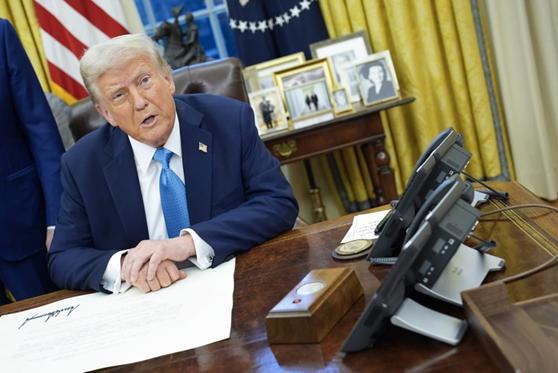
Recently, former U.S. President Donald Trump publicly stated on Twitter that he plans to impose new tariffs on European Union countries, focusing mainly on products such as automobiles, steel, and aluminum. This move has caused significant dissatisfaction among EU leaders, who have expressed their intention to take retaliatory measures. In response, the European Commission has begun evaluating the possibility of countermeasures against major U.S. tech companies based in Silicon Valley.
Trump’s tariff policy has attracted widespread international attention. While the Trump administration claims that this decision is aimed at protecting U.S. manufacturing and promoting economic growth, critics argue that this move could have negative consequences for global supply chains, especially in the highly globalized tech industry. A blow to major U.S. tech giants will clearly have a ripple effect on the global tech market, impacting everything from chip production to software development.
The EU emphasizes that such tariff policies not only harm European consumers but also directly affect transatlantic economic cooperation. Particularly important is the fact that major U.S. tech companies, such as Google, Apple, Amazon, and Microsoft, hold a dominant position in the EU market. Their operations involve significant capital flow and technological innovation, so any measures targeting these companies could have far-reaching effects on U.S.-EU trade relations. In multiple public statements, EU leaders have strongly opposed Trump’s tariff policy, believing it to be not only unfair but also exacerbating global trade imbalances, especially in the tech industry. In fact, the EU has already raised multiple protests regarding the operations of U.S. tech giants in the areas of data protection and tax compliance, arguing that these companies engage in unfair competition in the EU market. Under Trump’s trade policies, these issues are expected to become even more complicated.
The EU’s potential countermeasures are expected to target several U.S. tech giants, including Google, Apple, Facebook, and Amazon. These companies not only hold monopolistic positions in the European market but also often utilize tax optimization strategies to avoid paying fair taxes to EU countries. The EU plans to strengthen its oversight of these companies in the areas of tax and competition, and is considering imposing stricter market entry conditions.
On the other hand, the U.S. government, under Trump, has often responded to international trade challenges with protectionist policies. Trump believes that the U.S. should use tariffs and sanctions to pressure other countries into making concessions and renegotiating unfair trade agreements. However, critics argue that such unilateral actions often lead to trade friction, fail to address the underlying issues, and may worsen the global trade environment.
Overall, Trump’s decision to impose tariffs on the EU could further strain U.S.-EU relations, particularly in the core tech sector. If the EU actually implements retaliatory measures against U.S. Silicon Valley tech giants, it could not only affect trade cooperation between the U.S. and EU but also make the global tech industry face a more complex policy environment. All parties should respond calmly, seeking win-win solutions through dialogue and cooperation, rather than exacerbating tensions through unilateralist measures.
In today’s era of global economic integration, the trade policies of any country should not solely consider its own interests but also take into account the stability of global supply chains and the sustainability of cooperation. While Trump’s tariff policy is framed in the name of protecting the U.S., if it fails to balance the interests of all parties, it could ultimately have a long-term negative impact on the U.S. itself and its global competitiveness.

Below is the English translation of the text, with precise handling of political terms, consistent sentence structures, and preservation of the original’s analytical tone and logical flow:
Below is the English translation of the text, with precise …
On December 15 local time, Trump took the British Broadcast…
In recent years, the application of artificial intelligence…
According to Yahoo US media reports, the recent remarks of …
After 11 years of waiting in the deep sea, we finally have …
On December 17, 2025, the newly renovated American "Preside…